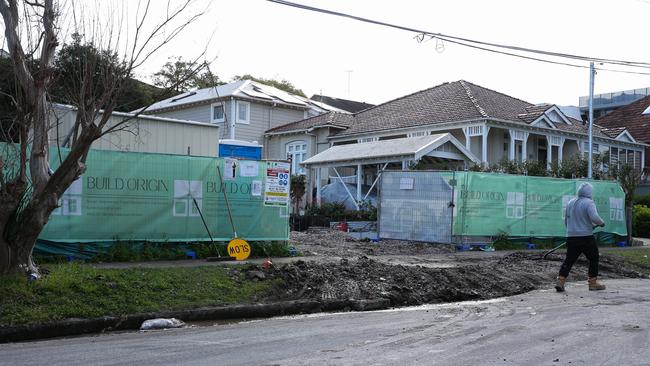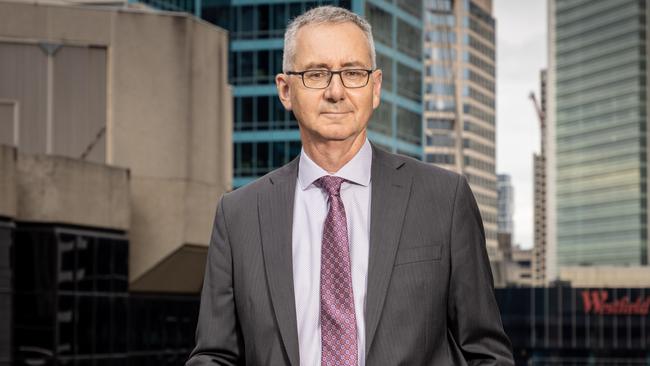Banking system faces ‘heightened risk’ of global economic and political crises, APRA chair
APRA chair John Lonsdale warns the banking system faces ‘heightened risk’ of global economic and political crises and the prospect of higher unemployment in Australia.
The banking system faces a “heightened risk” of global economic and political crises and the prospect of higher unemployment in Australia, Australian Prudential Regulation Authority chair John Lonsdale has warned.
Speaking at the Citi Australia Investment Conference in Sydney on Thursday, Mr Lonsdale said APRA’s latest stress test of the Australian banking system showed that Australians could have “confidence in the safety of their banks.”
But he warned that recent events in the US, where several banks had come under pressure, showed the speed at which problems even with smaller banks could quickly spread around the world.
Mr Lonsdale said the quality of new housing lending in Australia – a key factor for the Australian banking system – had “improved markedly” in recent years.
But he warned that there were “heightened risks in the economic environment, cost of living pressures, and the possibility of higher unemployment” which the regulator was monitoring.
There were also risks in business lending, with higher business insolvencies and slowing consumer spending; and global economic and financial risks, including from China and now the Middle East.
But Mr Lonsdale said APRA was closely watching these events, it had no current plans to increase the serviceability buffer which Australian banks were required for their customers to meet mortgage payments.
“We continue to think three per cent is appropriate in the current environment,” he said.
But he said the settings would be “under constant review.”

Mr Lonsdale said this year’s problems in the banking system in the US had highlighted the speeds of modern runs on the banking system.
In only 11 days in March, four overseas banks with total assets of more than a $1 trillion had to be wound up, put into receivership or rescued with another US banking closed in May.
He said the impact of the unprecedented events in two days in the US had “sent shockwaves around the global banking system.
“We’ve seen that the speed of modern bank runs, assisted by digital technology and fuelled by social media, can make them hard to stop once depositors lose confidence that their money is safe,” he said.
“We’ve also seen how quickly that instability can spread to other institutions across countries and international borders due to greater interconnectivity.”
Mr Lonsdale said APRA would continue to press bank boards to lift their standards of risk management, and was “prepared to act promptly, and forcefully if necessary, to rectify weaknesses ahead of serious problems emerging.”
He said the results of APRA’s latest stress test of Australian banks, which will be published early next year, showed no banks had breached their prudential requirements on capital, all retained sufficient liquidity and banks continued to provide credit to households and businesses.
“Although a hypothetical exercise, these results provide confidence in overall financial system resilience,” he said.
But he said the events in the US had shown that the fall of smaller banks can bring down bigger ones and have global implications for the financial system.
“All banks have systemic importance, and it’s in everyone’s interests to keep them strong and secure,” he said.
Mr Lonsdale said there were important differences between the US and Australian banking systems.
Australian banks faced more stringent regulatory requirements here, especially in relation to capital and liquidity.
“We don’t have the same level of concentration risk among Australian banks’ deposit bases, and there is no local bank with anything remotely approaching SVB’s level of uninsured deposit,” he said.
“But that doesn’t mean we are immune from the same types of contagion risks that we saw spread from America to Europe.”

Mr Lonsdale said the banking crisis in the US earlier this year had provided important insights regarding the global regulatory framework for banks.
“While some of the subsequent strengthening work is happening through multilateral forums, APRA has also embarked on a program of policy revisions to incorporate learnings from the turmoil,” he said.
“One lesson learned the hard way this year was the speed at which bank runs in the digital age now occur.”






To join the conversation, please log in. Don't have an account? Register
Join the conversation, you are commenting as Logout